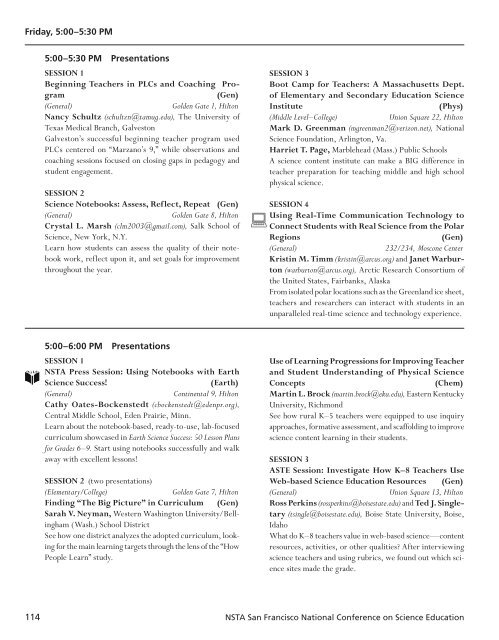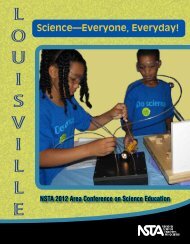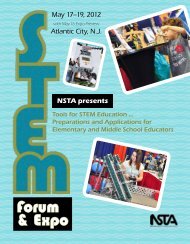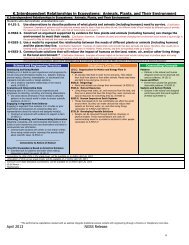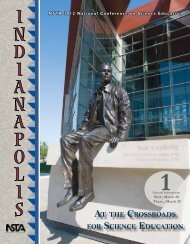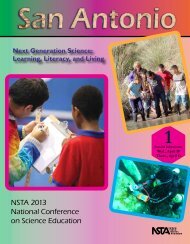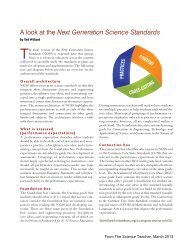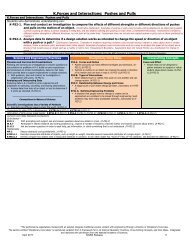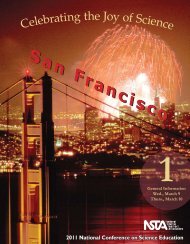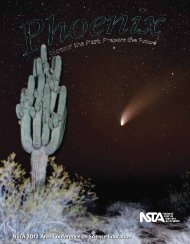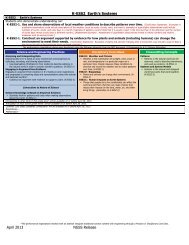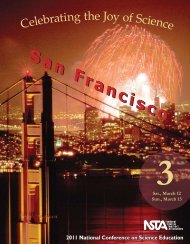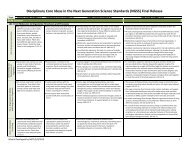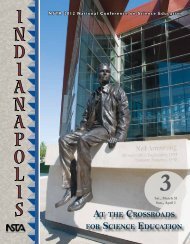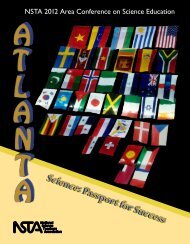San Francisco Program, Vol. 2: Friday - National Science Teachers ...
San Francisco Program, Vol. 2: Friday - National Science Teachers ...
San Francisco Program, Vol. 2: Friday - National Science Teachers ...
Create successful ePaper yourself
Turn your PDF publications into a flip-book with our unique Google optimized e-Paper software.
<strong>Friday</strong>, 5:00–5:30 PM<br />
5:00–5:30 PM Presentations<br />
SESSION 1<br />
Beginning <strong>Teachers</strong> in PLCs and Coaching <strong>Program</strong><br />
(Gen)<br />
(General)<br />
Golden Gate 1, Hilton<br />
Nancy Schultz (schultzn@tamug.edu), The University of<br />
Texas Medical Branch, Galveston<br />
Galveston’s successful beginning teacher program used<br />
PLCs centered on “Marzano’s 9,” while observations and<br />
coaching sessions focused on closing gaps in pedagogy and<br />
student engagement.<br />
SESSION 2<br />
<strong>Science</strong> Notebooks: Assess, Reflect, Repeat (Gen)<br />
(General)<br />
Golden Gate 8, Hilton<br />
Crystal L. Marsh (clm2003@gmail.com), Salk School of<br />
<strong>Science</strong>, New York, N.Y.<br />
Learn how students can assess the quality of their notebook<br />
work, reflect upon it, and set goals for improvement<br />
throughout the year.<br />
<br />
SESSION 3<br />
Boot Camp for <strong>Teachers</strong>: A Massachusetts Dept.<br />
of Elementary and Secondary Education <strong>Science</strong><br />
Institute<br />
(Phys)<br />
(Middle Level–College)<br />
Union Square 22, Hilton<br />
Mark D. Greenman (mgreenman2@verizon.net), <strong>National</strong><br />
<strong>Science</strong> Foundation, Arlington, Va.<br />
Harriet T. Page, Marblehead (Mass.) Public Schools<br />
A science content institute can make a BIG difference in<br />
teacher preparation for teaching middle and high school<br />
physical science.<br />
SESSION 4<br />
Using Real-Time Communication Technology to<br />
Connect Students with Real <strong>Science</strong> from the Polar<br />
Regions<br />
(Gen)<br />
(General)<br />
232/234, Moscone Center<br />
Kristin M. Timm (kristin@arcus.org) and Janet Warburton<br />
(warburton@arcus.org), Arctic Research Consortium of<br />
the United States, Fairbanks, Alaska<br />
From isolated polar locations such as the Greenland ice sheet,<br />
teachers and researchers can interact with students in an<br />
unparalleled real-time science and technology experience.<br />
5:00–6:00 PM Presentations<br />
SESSION 1<br />
NSTA Press Session: Using Notebooks with Earth<br />
<strong>Science</strong> Success!<br />
(Earth)<br />
(General)<br />
Continental 9, Hilton<br />
Cathy Oates-Bockenstedt (cbockenstedt@edenpr.org),<br />
Central Middle School, Eden Prairie, Minn.<br />
Learn about the notebook-based, ready-to-use, lab-focused<br />
curriculum showcased in Earth <strong>Science</strong> Success: 50 Lesson Plans<br />
for Grades 6–9. Start using notebooks successfully and walk<br />
away with excellent lessons!<br />
SESSION 2 (two presentations)<br />
(Elementary/College)<br />
Golden Gate 7, Hilton<br />
Finding “The Big Picture” in Curriculum (Gen)<br />
Sarah V. Neyman, Western Washington University/Bellingham<br />
(Wash.) School District<br />
See how one district analyzes the adopted curriculum, looking<br />
for the main learning targets through the lens of the “How<br />
People Learn” study.<br />
Use of Learning Progressions for Improving Teacher<br />
and Student Understanding of Physical <strong>Science</strong><br />
Concepts<br />
(Chem)<br />
Martin L. Brock (martin.brock@eku.edu), Eastern Kentucky<br />
University, Richmond<br />
See how rural K–5 teachers were equipped to use inquiry<br />
approaches, formative assessment, and scaffolding to improve<br />
science content learning in their students.<br />
SESSION 3<br />
ASTE Session: Investigate How K–8 <strong>Teachers</strong> Use<br />
Web-based <strong>Science</strong> Education Resources (Gen)<br />
(General)<br />
Union Square 13, Hilton<br />
Ross Perkins (rossperkins@boisestate.edu) and Ted J. Singletary<br />
(tsingle@boisestate.edu), Boise State University, Boise,<br />
Idaho<br />
What do K–8 teachers value in web-based science—content<br />
resources, activities, or other qualities After interviewing<br />
science teachers and using rubrics, we found out which science<br />
sites made the grade.<br />
114 NSTA <strong>San</strong> <strong>Francisco</strong> <strong>National</strong> Conference on <strong>Science</strong> Education


